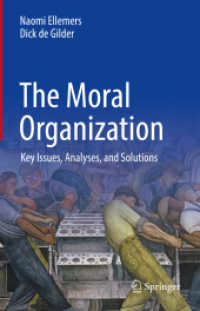Full Description
Work, Family, Health, and Well-Being grew out of a conference held in Washington, D.C. in June 2003 on "Workforce/Workplace Mismatch: Work, Family, Health, and Well-Being" sponsored by the National Institutes of Health (NIH). The text considers multiple dimensions of health and well-being for workers and their families, children, and communities. Investigations into the socioeconomic gradient in health within broad occupational categories have raised important questions about the role of specific working conditions versus the role of conditions of employment such as wages and level of job security afforded a worker and his/her family in affecting health outcomes.
Organized into seven parts, this text:
*provides an overview of changes in work and family time and time use;
*dedicates a section focusing specifically on employers and workplaces;
*explores disciplinary perspectives on work, family, health, and well-being;
*focuses on the most studied work and family nexus, the interrelationship between parental employment, especially maternal employment and the child's well-being;
*examines gender differences in the division of labor, the effect of marriage on health, the shifting nature of care-giving throughout life, and the role of work on various health and well-being outcomes;
*explores occupational health literature; and
*focuses on the unique work-family issues faced by low-income families and workers in low-wage jobs.
This book appeals to anyone in the fields of psychology, sociology, family studies, demographics, economics, anthropology, and social work.
Contents
Contents: K.E. Christensen, Foreword. Preface. S.M. Bianchi, L.M. Casper, R.B. King, Complex Connections: A Multidisciplinary Look at Work, Family, Health, and Well-Being. Part I:Time, Work, and Family.S.M. Bianchi, S.B. Raley, Time Allocation in Families. H.B. Presser, Embracing Complexity: Work Schedules and Family Life in a 24/7 Economy. A.C. Crouter, S.M. McHale, Work, Family, and Children's Time: Implications for Youth. B. Schneider, L. Waite, Timely and Timeless: Working Parents and Their Children. Part II:The "Work" in Work and Family.H.J. Holzer, Work and Family Life: The Perspective of Employers. E.E. Kossek, Workplace Policies and Practices to Support Work and Families. C.A. Thompson, J.K. Andreassi, D.J. Prottas, Work-Family Culture: Key to Reducing Workforce-Workplace Mismatch? L. Bailyn, Filling the Gap by Redesigning Work. A. Bookman, Can Employers Be Good Neighbors? Redesigning Workplace-Community Interface. S. Jekielek, Z. Redd, R. Wertheimer, K.A. Moore, Z. Redd, Government Policies as External Influences on Work-Family Trade-Offs. Part III:Disciplinary Perspectives in the Study of Work and Family.D.A. Major, J.N. Cleveland, Psychological Perspectives on the Work-Family Interface. A.A. Leibowitz, An Economic Perspective on Work, Family, and Well-Being. C.N. Darrah, Anthropology and the Workplace-Workforce Mismatch. J. Glass, Sociological Perspectives on Work and Family. J. Waldfogel, Work and Family Research: A Public Policy Perspective. Part IV:Parental Employment and Outcomes for Children.R. Repetti, A Psychological Perspective on the Health and Well-Being Consequences of Parental Employment. M. Zaslow, S. Jekielek, M. Gallagher, Work-Family Mismatch Through a Child Developmental Lens. J. Currie, When Do We Really Know What We Think We Know? Determining Causality. S. Korenman, R. Kaestner, Work-Family Mismatch and Child Health and Well-Being: A Review of the Economics Research. C.J. Ruhm, How Well Do Government and Employer Policies Support Working Parents? Part V:Gender and Employment, Caregiving and Health.J.K. Fletcher, Gender Perspectives on Work and Personal Life Research. P.J. Smock, M. Noonan, Gender, Work, and Family Well-Being in the United States. R.M. Stolzenberg, L.J. Waite, Effects of Marriage, Divorce, and Widowhood on Health. E.K. Pavalko, F. Gong, Work and Family Issues for Midlife Women. Part IV:Occupations, Workplace Settings, and Health of Families.A.E. Dembe, The Impact of Occupational Injuries and Illnesses on Families. B.C. Amick III, C. Mustard, Labor Markets and Health: A Social Epidemiological View. T.S. Kristensen, L. Smith-Hansen, N. Jansen, A Systematic Approach to the Assessment of the Psychological Work Environment and the Associations With Family-Work Conflict. Part VII:Low-Income Families and Work, Care, Health, and Well-Being.M. Perry-Jenkins, Work in the Working Class: Challenges Facing Families. J.R. Henly, S. Lambert, Nonstandard Work and Child-Care Needs for Low-Income Parents. L.M. Burton, L. Lein, A. Kolak, Health and Mothers' Employment in Low-Income Families. J. Heymann, S. Simmons, A. Earle, Global Transformations in Work and Family. Part VIII: Conclusion.L.M. Casper, S.M. Bianchi, R.B. King, Forging the Future in Work, Family, Health, and Well-Being Research.








